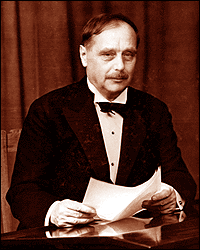The Post Early-20th-Century Science Fiction Quiz: Answers
Created | Updated Aug 27, 2012
How well did you know your early 20th-century scifi? Time to find out.
The Post Early-20th-Century Science Fiction Quiz: Answers

1. What scifi writer from Chittenango, New York, managed to get technology, superweapons, and economic theory into his fantasy novels for children?
Frank L Baum. Baum's 14 Wizard of Oz books even touted handheld wireless devices. Economic theory, you ask? Many people believe that the original Wizard of Oz story was really about – wait for it – bimetallism. Oh, for gosh sakes, you know the Editor is innumerate. Bimetallism is an old US argument about the gold standard. The 'ruby slippers' from the film were silver in the book, and the road was, er, gold, get it? According to this theory, the Tinman was a factory worker and the Scarecrow a member of the Progressive-Era farmers' Grange Movement, and the Wizard was the President, and…you get the idea. It all sounds vaguely Socialist, and we wonder if Mr Baum voted for Eugene V Debs.
2. We don't think of this fellow as a science fiction writer. In fact, mentioning his name makes most of us think of sea yarns, the Yukon, and dogs. But he wrote several works of science fiction, including one in which some Pacific Islanders were worshipping an alien artefact, which puts him ahead of the Doctor Who franchise. Can you name the writer, and for extra credit, the story?
Of course you can: Jack London was the fellow's name, and when he wasn't writing The Call of the Wild or The Sea Wolf, he was coming up with tales like The Red One, about a strange sphere from outer space.

3. His father invented the editorial. (Now we know who to blame.) But Unitarian clergyman Edward Everett Hale wrote the first short story about. . . what science fiction wonder?
The artificial satellite. When he wasn't writing stirring, jingoistic short stories for kids to be forced to read in school (see The Man Without a Country), Hale was making himself actually useful. His story about a space station was a serial in the Atlantic Monthly called The Brick Moon.
4. We ALL know that Jack Carter lives in Eureka, Oregon, these days, where he's sheriff to a town full of dangerous geeks. But Jack's name is a reference. Who invented the original John Carter, and what other famous character did he invent?
Edgar Rice Burroughs invented the famous Mars explorer. (For what the movie people did to him, check out Awix's review.) Carter's fictional sibling – in the sense of having the same author – was Tarzan.
5. What 1901 short story by HG Wells ended up as a Star Trek episode?
The story was called 'The New Accelerator'. It inspired the Star Trek episode 'Wink of an Eye', in which time-accelerated aliens attempt to kidnap the crew of the Enterprise. Not that this had ever happened before. . . (By the way, for fans of Warehouse 13: the real HG Wells didn't look much like Jaime Murray.

6. Why do experts date the invention of science fiction as an independent genre to 1926, and what famous name is associated with this development?
Pulp fiction, of course. (It's not all about the dancing.) The genius founder of it all was Hugo Gernsback, who started publishing only science fiction stories in his magazine, Amazing Stories, in – you guessed it – 1926. Er, and yeah – the Hugo Awards are named after Mr Gernsback.
7. For this one, you don't have to remember (or be able to pronounce) the name of the writer who coined the word 'robot'. Just tell us what language the word 'robot' comes from.
Czech. (You knew that.) The writer was Karel Capek, and the work was a play called R.U.R.. (If you guessed Russian, you were close.) Rod Serling never failed to amuse by pronouncing the word 'ROW-but'.
8. The 1930s saw many terrible events in what is often laughably called 'Real Life'. There was a lot of reason to ignore the 'Don't Panic' sign. What fictional 'event' caused a real-life panic in the US in 1938?
Aw, that was too easy, right? The War of the Worlds broadcast on radio by Orson Welles and his Mercury Theatre. The broadcast about an alien invasion wasn't a deliberate hoax. Apparently, people in New Jersey frighten easily.
9. Speaking of the overlap between science fiction and science reality, what topic was so touchy during World War II that the mere mention of it brought the FBI down on the offices of Astounding Science Fiction?
Atomic weapons, according to a story recounted by Isaac Asimov. We think he was proud of the effect science fiction had. Asimov was also heard to state that science fiction magazine publishers knew where the scientists were working on the atom bomb – all they had to do was to look at their mailing list. Why else were there suddenly hundreds of people in Oak Ridge, Tennessee with an overwhelming desire to read about aliens?
10. Science fiction prepared the public to believe a lot of unusual things. What 1947 US event completely blurred the line between science fact and science fiction, and what did the government do about it?
In 1947, a UFO crashed in Roswell, New Mexico. Or did it? Nobody knows for sure. Was it a weather balloon (a likely story)? Was it something else? On 8 July, 1947, the Roswell Daily Record published with the headline, 'RAAF Captures Flying Saucer on Ranch in Roswell Region'. So did they, or didn't they? The government 'investigated'. The government claimed it was all a mistake. Some people believe this, others do not. The fact remains that the Roswell Incident is a fruitful subject for fans of science fiction and tinfoil hat theorists alike.
We hope you enjoyed this one. Pass the word. . . we are not alone.

